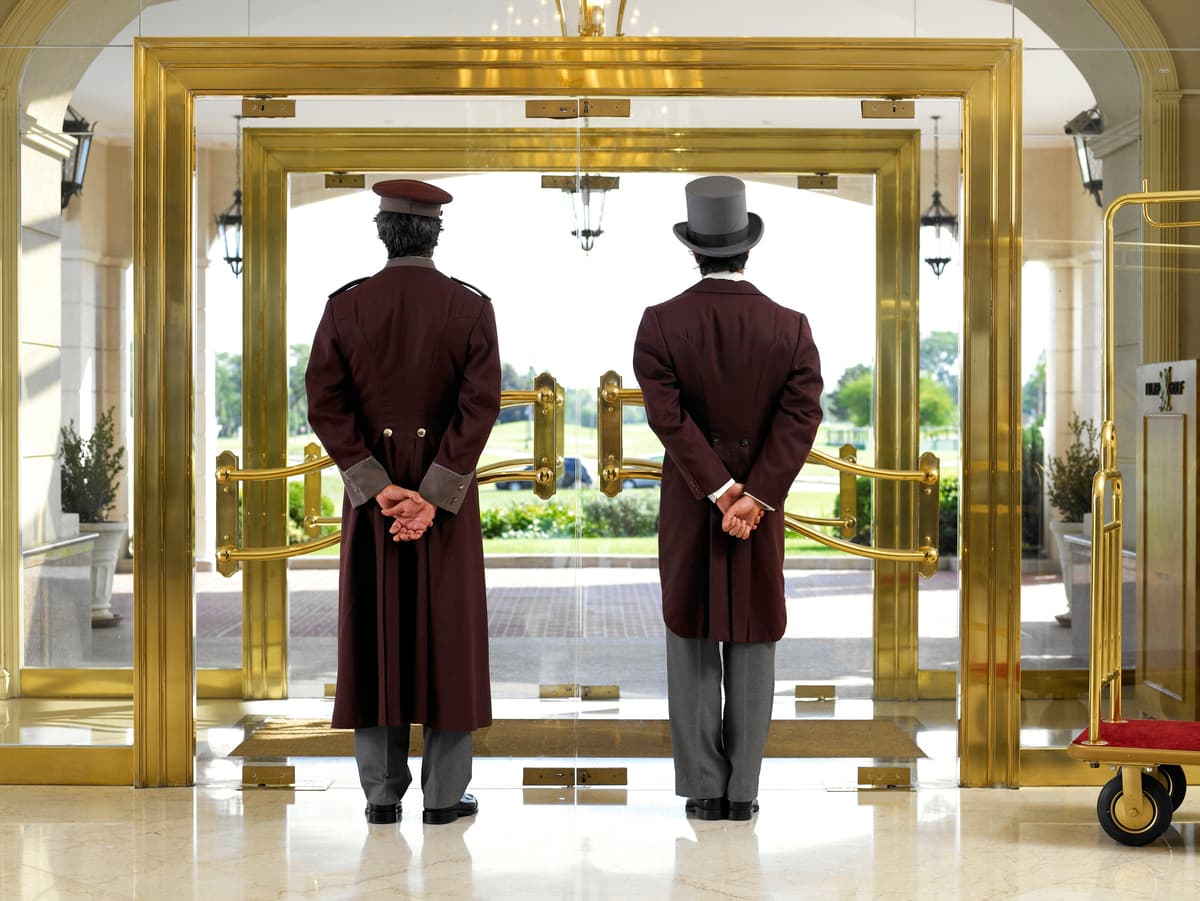How do I start a career in hotels?
9th July, 2024

The hotel industry is one of the fastest-growing hospitality sectors, with more than 187,000 hotels worldwide accounting for 10% of global GDP. That means a career in hotel management can open doors to a host of exciting opportunities and experiences. If your passion lies in meeting new people and creating memorable guest experiences, there are plenty of different roles that you can aim for within the hotel sector.
In this guide, we will examine the steps you need to take to start a career in hotels, including the qualifications, experience and skills required to succeed in this dynamic industry.
Understanding the different paths within hospitality
The hospitality industry is huge and includes everything from hotels and resorts to restaurants, cruise lines and event management companies. A career in it offers diverse opportunities, including hotel management, customer service, event planning and tourism.
Hospitality professionals can pursue careers in a wide variety of positions in hotels, including:
- Front desk operations: welcoming guests, checking them in and out, providing information about the hotel’s services
- Housekeeping: making sure all guest rooms and public areas are well maintained, clean and comfortable at all times
- Food and beverage: looking after guests’ eating and drinking needs during their stay
- Sales and marketing: working ‘behind the scenes’ on strategies to attract new guests and promote the hotel’s brand and offerings
- Management: overseeing all aspects of hotel operations, including budgeting, staffing and guest experience
- Event planning: organizing and coordinating events, including conferences, corporate gatherings and weddings
Essential skills for a successful career in hospitality
If you’re looking to pursue hospitality as a career, there are a number of essential skills you will need to develop, including:
- Communication: articulating clearly and listening attentively to guests and colleagues, encouraging positive interactions and resolving issues effectively
- Customer service: cultivating a genuine desire to exceed guest expectations, providing personalized attention and ensuring memorable experiences
- Adaptability: embracing change and remaining flexible in fast-paced environments, adjusting to diverse situations and evolving guest needs
- Teamwork: collaborating harmoniously with colleagues from various departments and cooperating to deliver seamless service and guest satisfaction
- Attention to detail: maintaining meticulous standards in tasks such as room preparation, food presentation and guest preferences
- Problem-solving: approaching challenges resourcefully, using creativity and quick thinking to address issues and maintain guest satisfaction
- Time management: prioritizing tasks and managing schedules efficiently to optimize productivity and timely service delivery
- Cultural awareness: respecting and appreciating diverse backgrounds and customs, promoting inclusivity and sensitivity in interactions with guests from different cultures
Education and qualifications: your first steps into hotel roles
The most common route into a career in hotels is to gain a hospitality degree. While a formal hospitality education is not always required, having relevant qualifications can significantly improve your prospects.
Those with degree-level hospitality careers often enjoy greater opportunities for growth and advancement and are more likely to secure advanced roles such as hotel manager or operations manager.
Start by exploring the various job roles and hospitality career descriptions available to help you understand the specific skills and qualifications required for each of the different positions.
Hospitality schools offer a range of education programs that help prepare you for working in the hotel industry, ranging from bachelor’s degrees to professional certificates.
While an associate degree or diploma may be sufficient for entry-level positions such as bartender, server or housekeeper, most hospitality employers prefer a bachelor’s degree for senior positions.
Consider the area of hospitality that interests you, such as hotel management, event planning or restaurant management and look for programs that provide specialist courses in your chosen field.
Securing the right qualifications is key to enjoying a successful career in hotels. By studying for a degree in hospitality, you can build the skills, knowledge, confidence and hands-on experience you need for a thriving career.
With our industry-leading tutors and exciting internship opportunities, you can kick-start your career in hospitality management.

How to get a job at a hotel with no experience
If you lack hotel experience, start by applying for entry-level positions. Roles such as front desk agent, housekeeper or restaurant server often require no prior experience and can serve as an excellent entry point into the industry.
To increase your chances of landing hotel jobs with no experience, tailor your resumé by highlighting any relevant hospitality skills or qualifications you have, such as customer service experience, attention to detail or ability to work in a fast-paced environment.
Emphasize any volunteer work, extracurricular activities or coursework you’ve completed that demonstrates your ability to excel in hospitality.
Networking can also help find your first job in the hotel industry and if you pursue a hospitality management career path. Attend job fairs and industry events or connect with professionals on LinkedIn.
Making connections and expressing your enthusiasm for the industry can open doors to opportunities that may not be advertised elsewhere.
Growing within the hospitality sector
Once you’ve secured a job in the hotel industry, you can focus on continuous learning and professional development to advance your career. If you aspire to climb the ranks, you could aim for a job in hotel management.
Roles such as hotel manager, assistant general manager or operations manager offer a wide range of responsibilities, from overseeing day-to-day operations and guest services to managing staff and budgets.
Seek opportunities to gain experience in different departments, take on additional responsibilities and pursue further education or certifications to improve your skills and qualifications.
Building a strong professional network and actively seeking mentorship can also accelerate your career growth in the hospitality sector.
How a hospitality school helps you build a hotel career
Hospitality schools offer specialized courses focused on hotel management, covering areas such as operations, marketing, finance, food and beverage and guest relations.
These are delivered by industry experts who bring real-world experience to the classroom, offering invaluable insights and perspectives.
Students benefit from hands-on training through internships, externships or cooperative education programs.
These practical experiences allow students to apply what they have learned in real hotel environments, where they develop practical skills and make industry connections.
Many schools also support a strong networking culture by organizing industry events, guest lectures and career fairs and providing students with access to professionals and potential employers.
You’ll also be able to develop your soft skills by focusing on communication, leadership, problem-solving and cultural awareness, which are essential for success in the hospitality industry.
Good schools also offer career services support, assisting students with resumé building, job searching, interview preparation and professional development to bridge the gap between education and employment.

LumiNola / E+ via Getty Images
Serious about your hospitality management career?
Insights on the latest industry trends, career development advice, and program releases from one of the world’s leading hospitality schools.
We respect your privacy. Unsubscribe at any time.
The role of technology in modern hospitality careers
Technological advances are revolutionizing the hotel industry, reshaping guest experiences and redefining operational standards.
From booking platforms to smart room controls, hotels are using technology to improve efficiency, personalize services and streamline operations.
Mobile check-ins, digital concierge services and keyless entry systems have become commonplace, offering guests convenience and flexibility.
Also, data analytics tools are now enabling hotels to anticipate guest preferences, optimize pricing strategies and improve marketing efforts.
Being proficient in modern technology is no longer optional but essential for aspiring hotel professionals alongside excellent communication skills and first-class customer service.
Familiarity with property management systems, online booking platforms and revenue management software is also seen as a prerequisite.
However, technology is not just transforming guest interactions; it’s also reshaping job roles. Automation and artificial intelligence are streamlining repetitive tasks, leading to the creation of new positions that require technological expertise.
Roles such as data analysts, digital marketing specialists and IT support staff are becoming increasingly prevalent.
As an aspiring hotel professional, you should expect to continually update your skills and knowledge to stay relevant in a tech-driven industry where innovation is a constant.
Understanding the global landscape of hotel careers
It’s a great time to start a career in hotels. The sector is undergoing a significant transformation, driven by shifting consumer preferences and technological advancements.
For an in-depth look at the global landscape, you can explore the hotel management career guide.
Traditional roles such as front desk staff and housekeepers are evolving into new positions such as sustainability managers, experience curators and data analysts.
Meanwhile, the hospitality sector is expanding rapidly, with emerging markets such as Asia-Pacific and Africa experiencing robust growth in tourism and hospitality infrastructure.
The hotel industry offers diverse opportunities for growth and advancement and accommodates a wide range of skillsets and interests. Whether your passion lies in culinary arts, event planning or guest relations, there’s a role suited to your talents.
The global nature of the hospitality sector also provides great opportunities for international travel, while an increased focus on sustainability and ethical practices has opened doors to more meaningful and impactful careers.
Common challenges in hotel careers and how to overcome them
Despite its many rewards, a career in the hotel industry can also present several challenges. Among the main ones are:
- Time management: balancing multiple tasks efficiently by prioritizing tasks and minimizing distractions
- Communication barriers: overcoming language or cultural differences through patience, active listening and seeking clarification when needed
- Conflict resolution: handling disputes among guests or staff diplomatically, focusing on finding mutually beneficial solutions
- Stress management: implementing relaxation techniques, setting boundaries and seeking support from colleagues or mentors
- Work-life balance: establishing boundaries between professional and personal life, allocating time for self-care and leisure activities
- Adaptability: embracing change in the hospitality industry by staying updated on trends and continuously learning new skills
- Customer satisfaction: addressing guest concerns promptly, exceeding expectations and maintaining a positive attitude even in challenging situations
Overcoming these challenges involves proactive self-awareness, resilience and continuous self-improvement through training, feedback and seeking guidance from experienced professionals.
Conclusion: embarking on your hotel career
A career in the hotel industry can be exciting and rewarding, filled with opportunities for personal and professional growth.
By honing essential skills, pursuing relevant education and qualifications and embracing technological advancements, you can build a successful and fulfilling career.
Remember to stay proactive, adaptable and passionate about delivering exceptional service to guests and you’ll be well on your way to achieving success in the exciting world of hotel careers.
Once you’ve started, the next step is advancing your skills and qualifications. Pursuing the right master’s degree can significantly elevate your career, opening doors to higher positions and specialized roles in the hospitality industry.
Main Image: Michael Blann / DigitalVision via Getty Images
